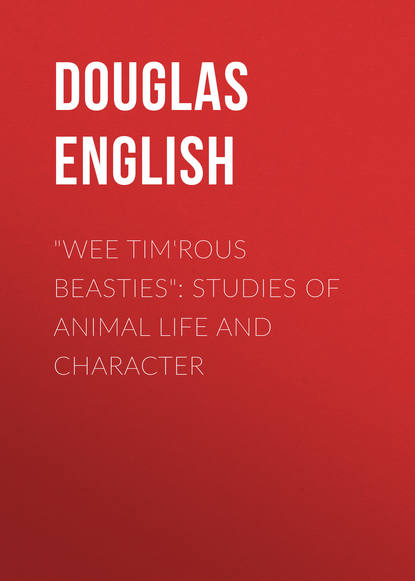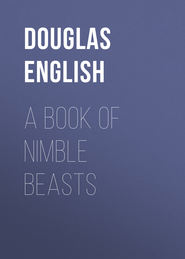По всем вопросам обращайтесь на: info@litportal.ru
(©) 2003-2024.
✖
"Wee Tim'rous Beasties": Studies of Animal life and Character
Настройки чтения
Размер шрифта
Высота строк
Поля
“That is all very well,” said I; “but it seems to me that there ought to be room for both of you.”
“Well, there isn’t,” said he, “and Nature has worked it out that there shan’t be, and if you write a thousand letters to the Field, you won’t alter that.”
“Suppose the martins got the pull over the sparrows, do you think it would be better for things in general?”
“You mean better for yourself,” said the sparrow, sharply.
On reflection, I came to the conclusion that that was just what I did mean.
“I don’t believe an increase of insect-eating birds would do you much good,” he went on. “Suppose, for instance, the ichneumon flies were decimated, what a time it would be for the caterpillars! How would some of your plants get on if there weren’t enough insects to fertilize them?”
I felt it was time to shift my ground. “Let us get back to your early history,” said I. “What was the nest like?”
“It was in a hole of a tree-stump,” said he. “A silly sort of place, I think, not ten feet from the ground. Now I always build as high as I can—just underneath the rooks’-nests, in fact. You’re safe from boys; they don’t shoot your nest to bits for fear of shooting the rooks’-nests too; and there’s abundance of insect food on the spot. The nest itself was mostly feathery stuff, though I remember a piece of pink paper, which used to tickle me. I suppose the colour of it took the old birds’ fancy. Of course the nest was distinct from the casing. That was the usual straw. I think it is the casing of sparrows’-nests that you humans object to as untidy.”
“We chiefly object to the portion which stops up the water-pipes,” said I. “What did you have to eat?”
“Insects, I expect, to start with. At least, that is what I always give my youngsters; then, as my gizzard strengthened, small, hard seeds; then bigger ones; finally, corn itself. That is my favourite diet at the present time. Three parts of what I eat is corn, the rest is insects, seeds, and scraps.”
IT WAS IN A HOLE OF A TREE-STUMP.
“You can get corn all the year round?”
“Oh! easily enough. In the fields, when it is growing; round the wheat-stacks later, or among the poultry—people don’t shoot into the middle of the poultry—anywhere, in fact.”
“And you really like corn better than anything?”
“There is nothing quite so nice in the world,” said the sparrow, “as fresh, young corn in the ear, which you can just squeeze the juice out of and then drop.”
“And are you aware of the amount of damage which you do to the poor, struggling farmer?” said I, assuming a judicial severity which I was far from feeling.
The flippancy was infectious.
“A recent estimate places it at £770,094 per annum,” said the sparrow. “Just think of that!”
“In this country alone,” said I. “You seem to forget America, Australia, South Africa, and all the other places to which you have been unhappily introduced as an insecticide.”
“You seem to forget,” he retorted, “that it was you yourselves who made the introduction. You tried to improve on the natural balance which was ordained for this string of countries, and a pretty mess you have made of it. Now you want to crown your folly of introducing the sparrow where Nature said it was not wanted, by exterminating it where Nature says it is wanted—and that’s here.”
“I don’t think any one has suggested that you should be exterminated,” said I.
“‘To lessen their numbers in our country, every possible means must be had recourse to.’ There’s a pretty piece of grammar for you.”
He was obviously quoting again.
“You couldn’t exterminate me if you tried, and, therefore, you very properly don’t suggest it. I have been called the Avian Rat, and I am the Avian Rat. You can no more get rid of me than you can of my four-footed counterpart. It would be a bad day for you if you could.”
“But you must admit that both you and the rat are increasing in numbers, and, therefore, in destructiveness. What is to be the end of it?”
“The end of it will be that you will preserve our enemies instead of shooting them at sight.”
“Meaning?”
“Hawks, owls, weasels, and so on.”
“But hawks would never come near the towns?”
“We aren’t in town the whole year round. Even the cockneyest of sparrows has his month or two in the cornfields. I don’t mind telling you that one of the reasons we have for clinging to human habitations is that we are thus sure of sanctuary. Our natural enemies will always be welcomed with a gun. They know that, too, and keep away. Make it an offence to kill a bird or beast of prey, and you will see a difference in the rats and sparrows.”
“What about the pheasants?” said I.
“There would be fewer pheasants,” said the sparrow; “and, if you only knew it, they would taste better, if there were.”
YOU HAVE BEEN SHOT AT.
“Sparrow,” said I, “to speak disrespectfully of the battue places you at once outside the pale. You are an Avian Rat. You do consume an inordinate quantity of corn. Since history began you have been an impudent parasite on man. As a hieroglyphic character you signified the enemy. Choleric old gentlemen have been roused to frenzy over your misdeeds. You have been shot at, trapped, poisoned, netted. Like the chafers, you have been excommunicated. You have been made into a yearly tribute, by the thousand. Laws have been enacted to compass your destruction, letters have been written to the Field, and yet—and yet—an inscrutable Providence has decreed that you shall survive, increase, and multiply. What good do you do?”
TRAPPED.
“Have you ever heard me sing?” said the sparrow.
“Sing!” I cried; “that sempiternal twitter, that intolerable chirrup that destroys the best and latest hours of sleep! Do you call that singing?”
“What bird would you prefer?” he blandly inquired.
I considered for a moment. The grim possibility of ten thousand nightingales yodelling in chorus, of ten thousand skylarks, or of ten thousand cuckoos, determined my answer.
“I cannot think of one,” said I. “But this is no merit on your part, it is merely a qualification of evil.”
NETTED.
“I thought you would acknowledge that,” said the sparrow. "But, seriously, you ask me what good I do, and I will tell you. That my infant food consisted entirely of insects and caterpillars you already know. Turn the statistician to work who has so cunningly reduced my corn-depredations to pounds, shillings, and pence, and he will assuredly find that the insects devoured by the infant sparrow population in a year will amount to hundreds of millions. These, mind you, are insects large enough to be brought to us in our parent’s beaks.
AVIAN RAT, INDEED! RATHER AVIAN SCAVENGER!
“But what of the insect eggs devoured by us in winter, when most of your pretty insect-eating birds have flown to where the insect is commoner, fatter, and fuller-flavoured? It is we stay-at-home British birds that really keep the insects down. I know that insect eggs do not appear in our poor dissected gizzards. How should they? How would you recognize their remains, O sapient sparrow-shooters? But they are there, for all that. Those blessed with eyes can see us hunting for them in the fallen leaves, among the garbage, in the crannies of the very pavement.
I FELT ASHAMED.
“What, again, of weed seeds in general, and knotgrass in particular? Avian Rat, indeed! rather Avian Scavenger, who draws his hard-earned pay in corn. Can you grudge him a few paltry millions? Would you exterminate him because in your blindness you only note the debit side? There is a Power behind the sparrow. It is Nature herself, and against Her fixed resolve nothing avails.”
He had worked himself into an incoherent frenzy; but, even as he relapsed from this fierce air of consequence to his vulgarian self, I felt ashamed.
THE AWAKENING OF THE DORMOUSE
He lay face downwards—two tiny fists tight-clenched against his cheeks, his feet curled up to meet them, his tail swung gracefully across his eyes.
Nine weeks had he lain thus, self-entombed. Within the hollow of the old hazel-stump he had fashioned a rough sphere of honeysuckle bark; within this, again, a nest of feathery grass stems. He had put the roof on last of all.






